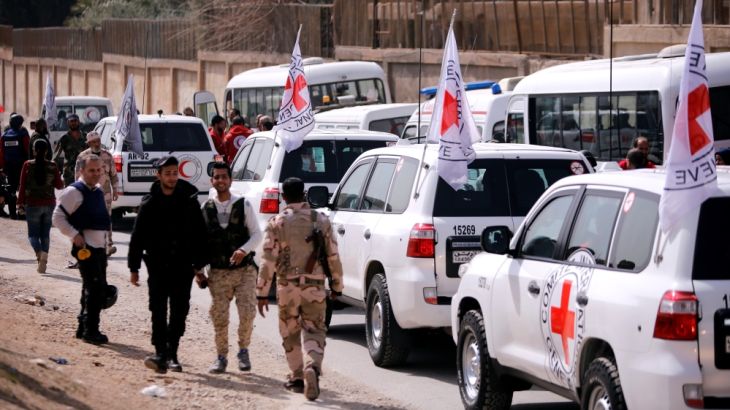Aid groups vow to deliver life-saving supplies to Eastern Ghouta
After Syrian government imposes obstacles on entry of supplies, aid agencies vow to resume delivery on Thursday.

Geneva, Switzerland – The UN will try to resume the delivery of critical food and health supplies to the town of Douma in Syria’s Eastern Ghouta on March 8 if conditions allow, UN officials have announced.
A UN spokesperson said Tuesday that a humanitarian aid convoy carrying food and health supplies for 75,000 people was only partially able to unload its content on Monday, as heavy shelling from and into Eastern Ghouta continued, forcing the convoy to retreat.
Eastern Ghouta, a suburb of the capital, Damascus, has been under siege by government forces since 2013, as they attempt to drain the armed opposition operating there.
But as the war in Syria, which started in 2011, rages on, the 400,000 residents of Eastern Ghouta, like many besieged areas across the country, have borne the brunt of the fighting.
On Monday, aid agencies attempted to facilitate the entry of lifesaving food and medical supplies, which have not been allowed into the enclave for nearly a month, leaving many starving and in need of urgent medical care amid continuous shelling.
Some 10 trucks out of a total of 46 were not unloaded, and four trucks were only partially unloaded, said Jens Laerke, a spokesperson for the UN Office for the Coordination of Humanitarian Affairs.
The convoy was distributing food enough for 27,500 people, in addition to medical supplies, said Laerke, when it was forced to cut its operations short.
“The trucks entered at 2pm, and, for about nine hours during the offloading operations, shelling from Damascus into Ghouta and from Ghouta into Damascus never stopped,” Laerke said.
“Given the high level of insecurity, they decided to leave in order to protect the teams on the ground. We remain ready to deliver the second part of the aid on Thursday as planned.”
Rejection of supplies by Syrian government
Officials from the World Health Organization (WHO) and the UN Children’s Fund (UNICEF) announced that essential medical kits and drugs were rejected by Syrian health authorities and removed from the convoys before they entered the enclave.
Christophe Boulierac, spokesperson for UNICEF, said the Syrian health authorities removed essential medical kits also from the UNICEF supplies, especially surgical items, midwifery kits, and, for the first time, items used for diarrheal diseases.
A WHO official, Tarik Jasarevic, also confirmed the confiscation of about 70 percent of the supplies in its shipment, including “trauma and surgical supplies, insulin, among others.
“The WHO finds it necessary to resubmit the list of rejected items in the next convoy. It is obvious, however, that one convoy is not enough, and many people need to be evacuated to receive urgent medical care.”
Jasarevic said last year, 50 tonnes out of a total 130 were rejected.
UNICEF staff in the convoy said the crisis in the enclave was overwhelming.
“They reported that the anger and fear of families were palpable,” said Boulierac.
“Families have been living literally on the ground for almost all the time for the past four weeks. Living in basements has become the norm, with some containing up to 200 people, as scores of families escaping from other parts reach Douma for shelter.”
People have no access to clean water and they are looking for manually-operated pumps to draw water from shallow wells.
Sanitation is an enormous challenge, said Boulierac, with families having to use buckets and makeshift toilets in basements.